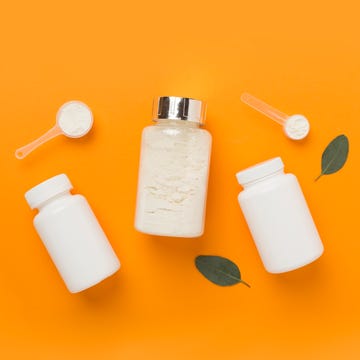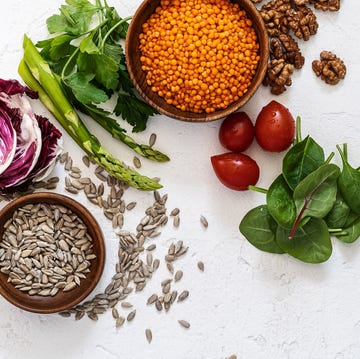My garden is trolling me. When we first moved in and inherited it, it was beautiful. ‘Was’ being the operative word. Its previous guardians were expert gardeners. I, on the other hand, have brown thumbs (the opposite of green fingers – something you probably know already, but I had to Google, proving yet again how little I know about gardening).
Every new weed, every parched leaf provides yet more evidence of my own ineptitude. But apparently, gardens don’t need to spike your blood pressure and stress you out. In fact, there’s a lot of science to suggest I’m an anomaly and just smelling the scent of some garden plants is enough to boost your health and wellbeing.
A 2023 study published in the International Journal Of Environmental Research And Public Health, for example, found that interacting with fragrant garden plants had a measurable and positive impact on participants’ feelings of relaxation. They also felt refreshed.
What to read next
There’s more. A recent study from Harvard University concluded that ‘strong natural odors from aromatic plants correlated with lower heart rate and reduced tension.’
Gardening expert Dan Cooper agrees: ‘There’s something very powerful about the scent memory of plants, especially tropical or Mediterranean ones. Smelling them, you might be transported to a holiday you’ve taken, somewhere associated with good times and relaxation, and that in itself has benefits.’
So which plants should you nurture in order to care for your own wellbeing, and what benefits do they provide?
Coriander
The Harvard study found that smelling coriander ‘significantly reduced tension’ among participants. I usually buy mine in the supermarket and struggle to keep it alive (thus increasing my tension). Where am I going wrong?
‘The ones you buy in supermarkets are very crowded in their pots,’ says Dan. ‘If you wanted to keep it going, the best thing is to take it out and tear it into chunks of three or four seedlings.’ These can each be put into a 9cm pot, grown indoors until they’re thriving and then planted outside, he suggests. ‘You’ll get lots of plants for your money and they’ll last a lot longer.’ Coriander is actually great for British gardens, he suggests, as it’s one of the few Mediterranean herbs that can take a little bit of shade.
Rosemary and Vicks Plant
The scents from these plants ‘significantly reduce heart rate, increase heart rate variability, and promote relaxation by modulating α and β brain wave activity,’ according to one study.
Another study concluded that rosemary’s benefits could extend further still. It suggests that people who inhaled rosemary’s scent performed better on memory tasks compared with those in an unscented environment. How? Rosemary stimulates blood circulation, including to the brain, helping to deliver more oxygen and nutrients, which may improve mental clarity, according to Dipa Kamdar, senior lecturer in pharmacy practice at Kingston University. Other studies have found it may also improve sleep.
So how should I plant mine? ‘Rosemary is the definitive Mediterranean plant,’ says Dan. ‘It likes full sun but it’s happy in quite poor soil. It’ll grow in quite dry, sandy rubbly soil.’ Its enemy, he explains, is wet soil: ‘That’s what’s likely to kill it in winter so, if you can, grow it on a bank or a slope. If you haven’t got lots of space, choose a prostrate variety that cascades over a wall or pot.’ Other varieties can get really big, really quickly, he warns.
Basil
The scent of basil reduced scores of tension, anger, fatigue and depression, researchers found. Overall, basil and Vicks plants: ‘Have the potential to induce relaxation and maintain calmness,’ they concluded.
As with coriander, Dan suggests buying a nice bushy basil plant from the supermarket, tearing it into chunks and growing them on separately. However: ‘It’s important to get basil used to outdoor temperatures,’ he warns. ‘Unlike coriander, it likes a really hot summer, so I usually plant mine out very late, say midsummer, when the nights are above 10 degrees.’ Even then, he suggests holding some back to grow on a windowsill or in a greenhouse. Then: ‘Pick it frequently, taking the buds and leaves.’ His favourite variety? ‘Queen of Sheba has the most intense scent of any basil,’ says Dan.
Jasmine
A 2023 study examined changes in brain behaviour as participants smelt jasmine, concluding that ‘the natural aroma emitted by pink jasmine’s flowers has potential benefits for human health, especially in terms of reducing stress and anxiety and improving memory. Our study showed that the natural aroma had a positive impact on human physiological and mental health.’
Could a novice like me ever hope to grow it? ‘There are so many types of jasmine,’ counsels Dan. ‘Some are hardy and others are really tropical, so more of a conservatory plant in the UK. The most perfumed tend to be the tropical ones, but the one you’d typically buy from a florist as a potted plant is Jasminum polyanthum, and that has an incredible perfume. In milder areas you can get away with growing it outside, but not in colder areas.’ If in doubt, he recommends Trachelospermum jasminoides – ‘it’s not a true jasmine, but it has the same fragrance and it’s a very popular garden plant,’ he explains.
Don’t plant… Catnip
The Harvard researchers warned that smelling this plant ‘increased negative emotions, such as anger and fatigue, while decreasing positive feelings, showing an overall negative psychological effect.’ Be warned!













